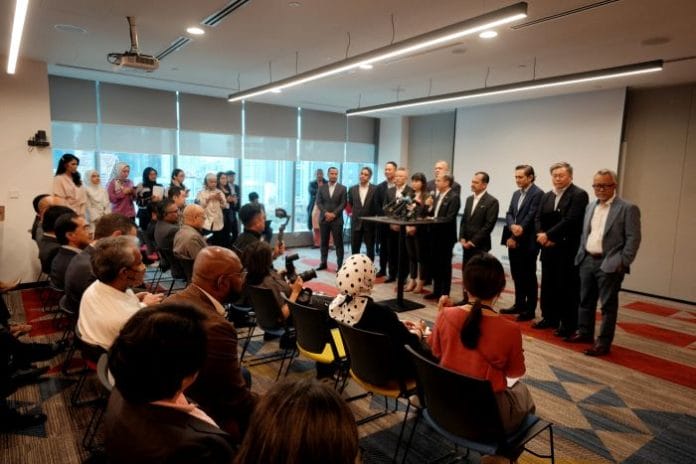Singapore media CNA has reported that Malaysia’s 5G rollout plan has gotten messier as the brokered deal between government owned Digital Nasional Berhad and the 5 telcos has broken down.
This was after a complex government-sponsored settlement agreement was reached in early December between state-owned 5G operator, Digital Nasional Bhd, and the country’s five private mobile telecommunications companies that saw all parties agreeing to a Dual Wholesale Model instead of the current Single Wholesale Model.
According to the report, it said Prime Minister Anwar Ibrahim’s government brought the warring factions together in a compromise that would potentially see the private telcos taking a stake in DNB, or forming a separate joint venture to become Malaysia’s second 5G operator to provide competition in the country’s booming mobile telecommunications sector.
CNA reported that the government officials and industry executives have acknowledged that after more than four months, both sides have yet to agree on so-called condition precedents (CP), legal parlance for events that must take place before a contract can come into effect. The CPs include the appointment of directors who would represent the private telcos in DNB, and the completion of three confidential audits on the state-owned entity by external experts. The audits would cover its financial standing, due diligence on large contracts the company has signed and a technical evaluation of its 5G systems.
“The audits are ongoing, but there is no agreement on the composition of the board. Nothing is moving because telcos are starting to have doubts on the path forward,” acknowledged a senior Finance Ministry official, who is monitoring the 5G situation it said.
The report noted industry executives saying that the uncertainty surrounding Malaysia’s 5G roll-out is likely to sideline potential investors interested in leveraging on the benefits of a superfast wireless network.
Analysts also noted that there is lack of visibility in the offtake of 5G and Malaysia’s relatively small market remains a serious issue.
“The whole situation is fuzzy because there is no clarity on the pricing of the 5G services and also the question of the shareholding at DNB,” said a chief of a bank-owned investment research firm.
Still, other analysts believe that there could be upside for the economy.
“Given the delay and uncertainty of network operational readiness, the bright shining opportunity is potentially the explosive growth in the semiconductor industry in Southeast Asia, where Malaysia is well-placed and positioned,” said Mr Jaafar Ismail of Fergana Advisory in Kuala Lumpur.
It was just under a year ago that the government caved in to pressure from the country’s private telco lobby to break DNB’s monopoly in the 5G space as the country’s so-called single wholesale network operator (SWN) and allow competition with a second operator, comprising local mobile network operators (MNOs) and the possibility of China’s Huawei emerging as the new technology partner.
Under the multi-tiered compromise settlement signed in December, the country’s five MNOs each paid DNB RM230 million (US$48.15 million), or a total of RM1.15 billion, as a pre-payment for access to the 5G network for a period of up to three years.
The second stage of the settlement called for due diligence into the operations of DNB that would allow the MNOs to decide whether to acquire stakes in the state-owned 5G entity or form a joint venture to operate a second network once more than 80 per cent of the current infrastructure is completed in populated areas, up from 73 per cent when the agreement was signed.
The due diligence reviews, which were expected to be completed in late January, are still ongoing, according to DNB executives who spoke on condition of anonymity.
What’s more, DNB has already rolled out more than 80 per cent of its network to date and according to Malaysia’s Communications Minister Fahmi Fadzil, almost 10 million people have subscribed to the 5G service at end-January, marking an adoption rate of just under 30 per cent.
“The big reason that the 5G situation is in a holding pattern is because there is a quiet rethink whether having a second network is the way forward,” noted a senior board director of state-controlled national telecommunications carrier Telekom Malaysia. Like other government representatives and industry executives, he spoke on condition of anonymity because of strict confidentiality agreements with regard to ongoing negotiations and the independent due diligence into DNB.
DNB’s roll-out, estimated to cost Malaysian taxpayers just over RM16.5 billion (US$3.44 billion), is now stirring debate within the government and private MNOs whether all parties should push ahead with the SWN model that could see the local players acquiring as much as a combined 70-per-cent interest in the state-owned concern, or simply disposing of a large stake in the company to an interested foreign entity.
It also said DNB officials are pressuring the administration to break out of its policy inertia over the 5G roll-out because the company could face a cash crunch in the coming months without a fresh injection of funds from the government.
“Unless merger with the MNOs is resolved soon, DNB will need an extension on the government guarantee,” noted the Finance Ministry official, who has received feedback from the 5G operator that “bankers are getting nervous”.
Meanwhile, the MNOs have long griped that apart from being denied the rights to own spectrum under the 5G roll-out, they were victimised further by the decision of the former premier Muhyiddin Yassin’s government to appoint three local entities to be preferred partners for global cloud service providers such as Microsoft, Google and Amazon, which are expected to take a lead role in the building and managing of hyper-scale data centres.
The appointments of public listed AwanBiru Technology, formerly known as Prestariang, and two other little-known entities, Enfrasys Solutions and Cloud Connect, were done without any open tender and the MNOs are privately demanding that the companies be stripped of their preferred partner status.
CNA









